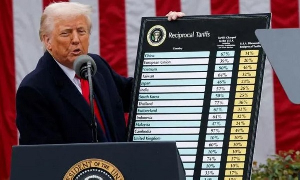Recent events have ignited a fierce debate surrounding the alleged negligence of some school authorities, which have tragically led to the deaths of students in some senior high schools across the country.
This disturbing trend has also raised serious concerns about the responsibilities of school leaders to ensure the well-being of their students, prompting urgent calls for greater accountability and improved healthcare in educational settings.
On February 5, 2024, a first-year student at Aburi Girls Senior High School in the Eastern Region lost her life after allegedly being denied medical attention by the school nurse, who reportedly accused her of feigning illness.
Despite her complaints of severe stomach pains, she was rushed to the hospital only after it was too late.
Just a week later, the parents of Kester Vadje, a 19-year-old student at Akim Swedru Senior High School, claimed that the school management had refused to grant their son permission to seek medical help, ultimately leading to his death on 1 February.
Kester was reportedly told he did not appear ill enough to warrant an excusal. His father eventually took him to two hospitals, but sadly, he succumbed to his condition.
On February 20, a 17-year-old student at Kalpohin Senior High School in the Eastern Region, died after the senior housemaster allegedly failed to provide timely medical assistance.
Fellow students, who witnessed their peer vomiting at the school entrance, attempted to alert the housemaster, on two occasions, before finally taking the student to the hospital, where it was tragically too late.
In the latest incident, Theophilus Ansah, a final-year science student at Ghana National College in Cape Coast, passed away following a brief illness.
His family has alleged that negligence by school authorities contributed to his untimely death.
Family spokesperson, Lucy Quianoo, expressed her outrage, stating, "We entrusted our son to the school, but they failed him. The school's negligence has cost us our son. We demand justice and accountability.”
NAGRAT's Call to Action
On July 20, the National Association of Graduate Teachers (NAGRAT) publicly urged heads of senior high schools to prioritise students' health and well-being.
This call comes in the wake of a recent legal ruling against Achimota School, which was found liable for negligence in a student's death eight years ago.
NAGRAT President, Angel Carbonu, emphasised the need for school leaders to act responsibly and ensure that students receive timely medical attention.
"When a student comes to you, you are not a medical professional. You cannot determine whether a student is sick or not, as you lack the expertise. When a student reports illness, it is imperative to refer them to qualified professionals.
"What right does a housemaster or housemistress have to deny a student the opportunity to seek medical help?", he quizzed.
The association hopes that the Achimota case will serve as a critical reminder for all educational institutions to prioritise the health and safety of their students, ultimately leading to improved health outcomes.
In light of these tragic events, it has become increasingly evident that school leaders must prioritise the well-being and safety of their students.
JKB/AE
Watch the latest episode of Everyday People on GhanaWeb TV below:
General News of Thursday, 18 July 2024
Source: www.ghanaweb.com
How alleged negligence by school authorities led to deaths of 4 SHS students
Meet the single mother who has built a house through the sale of 'kontomire' | Everyday People
0 seconds of 7 minutes, 17 secondsVolume 90%
Press shift question mark to access a list of keyboard shortcuts
Keyboard Shortcuts
Shortcuts Open/Close/ or ?
Play/PauseSPACE
Increase Volume↑
Decrease Volume↓
Seek Forward→
Seek Backward←
Captions On/Offc
Fullscreen/Exit Fullscreenf
Mute/Unmutem
Decrease Caption Size-
Increase Caption Size+ or =
Seek %0-9













